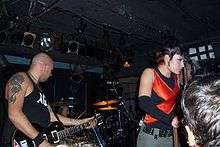Industrial rock
| Industrial rock | |
|---|---|
 Industrial rock band KMFDM | |
| Stylistic origins | |
| Cultural origins | Late 1970s United Kingdom and United States |
| Derivative forms | Digital hardcore |
| Fusion genres | |
| Industrial metal | |
| Regional scenes | |
| Germany | |
| Other topics | |
Industrial rock is a musical genre that fuses industrial music and rock music.
History
Origins (late 1970s and 1980s)
Experimental '60s group Cromagnon are said to have been one of the bands that helped foresee the birth of industrial rock.[1] Specifically, their song "Caledonia" has been noted for its "pre-industrial stomp".[2] Krautrock musicians Michael Rother and Klaus Dinger included industrial noise in their track "Negativland" (from their 1972 debut Neu!). Neu! inspired the opening track "Speed of Life" on David Bowie's Low recorded in Berlin. Bowie also collaborated with Iggy Pop on his 1977 solo debut The Idiot. The closing track "Mass Production" features mechanical sounds sampled on tape loops which heavily influenced Joy Division who were signed to the industrially themed label Factory Records which had been founded in 1978; their albums Unknown Pleasures (1979) and Closer (1980) heavily influenced the further development of industrial rock. Chrome has also been credited as the "beginning of industrial rock"[3] and their 1978 Half Machine Lip Moves was listed on Wire's 100 Records that set the world on fire (while no one was listening)[4].
Industrial rock was created in the mid- to late 1970s, amidst the punk rock revolution and disco fever. Prominent early industrial musicians include Throbbing Gristle, Cabaret Voltaire, NON, SPK and Z'EV.[5] Many other artists have been cited as influences such as Kraftwerk and Gary Numan and Tubeway Army as well as Einstürzende Neubauten and Fad Gadget. Many other musical performers were incorporating industrial music elements into a variety of musical styles.
Some post-punk performers developed styles parallel to industrial music's defining attributes. Pere Ubu's debut, The Modern Dance, was described as "industrial".[6] Killing Joke, considered by Simon Reynolds as "a post-punk version of heavy metal".[7] According to Chris Connelly, Foetus "is the instigator when it comes to the marriage of machinery to hardcore punk."[8]
Others followed in their wake.[9] The New York City band Swans were inspired by the local No Wave scene, as well as punk rock, noise music (particularly Whitehouse) and the original industrial groups.[10] Steve Albini's Big Black followed a similar path,[11] while also incorporating American hardcore punk.[12] Big Black has also been closely associated with post-hardcore and noise rock, though their ties to industrial music are extremely apparent. The Swiss trio The Young Gods, who deliberately eschewed electric guitars in favor of a sampler,[13] also took inspiration from both hardcore and industrial,[14] being equally indebted to the Bad Brains and Foetus.
Mainstream popularity (1990s)
.jpg)
In the 1990s, industrial rock broke into the mainstream with artists and bands such as Nine Inch Nails, Orgy, Rob Zombie, White Zombie, and Marilyn Manson. In December 1992, Nine Inch Nails' EP Broken was certified platinum by the Recording Industry Association of America (RIAA).[15] Nine Inch Nails gained further popularity with the release of their 1994 album The Downward Spiral. The Downward Spiral was certified 4x platinum by the RIAA in 1998.[16] Nine Inch Nails' 1999 album The Fragile was certified 2x platinum in January 2000.[17] With the success of Nine Inch Nails, the band's debut album Pretty Hate Machine was certified 3x platinum by the RIAA.[18] In the 1990s, four Nine Inch Nails songs went on the Billboard Hot 100.[19] Several industrial rock and industrial metal artists such as KMFDM, Fear Factory, Gravity Kills and Sister Machine Gun appeared on the 1995 Mortal Kombat: Original Motion Picture Soundtrack.[20] The soundtrack was certified platinum by the RIAA in January 1996.[21]

Marilyn Manson released their album Antichrist Superstar in 1996. The album was certified platinum by the RIAA two months after its release date.[22] In the United States, Antichrist Superstar sold at least 1,900,000 units.[23] Marilyn Manson's EP Smells Like Children was certified platinum in May 1998.[24] Marilyn Manson's album Mechanical Animals went to number 1, selling 223,000 copies in its first week in stores, knocking The Miseducation of Lauryn Hill by Lauryn Hill off of the top spot.[25] Mechanical Animals was certified platinum by the RIAA in February 1999[26] and sold at least 1,409,000 copies in the United States.[27] Orgy also experienced mainstream success during the 1990s. The band's 1998 album Candyass was certified platinum by the RIAA in July 1999.[28] Orgy's cover of New Order's song "Blue Monday" went to number 56 on the Billboard Hot 100[29] and number 2 on the Dance Club Songs chart.[30] White Zombie experimented with industrial metal on its 1995 album Astro-Creep 2000,[31] which was certified 2x platinum by the RIAA in March 1996.[32] White Zombie's vocalist Rob Zombie began creating pure industrial metal albums in his solo career. Rob Zombie's solo debut studio album Hellbilly Deluxe was certified 3x platinum by the RIAA less than two years after its release date.[33] In November 1999, Powerman 5000's album Tonight the Stars Revolt! was certified platinum by the RIAA.[34] The album sold at least 1,316,172 units in the United States.[35]
Labels
See also
- Industrial rock musical groups
- Industrial rock sales and awards
- List of industrial music bands
References
- ↑ https://www.allmusic.com/album/r966068
- ↑ "The 200 Greatest Songs of the 1960s - Page 4 - Pitchfork". pitchfork.com. Retrieved 20 February 2017.
- ↑ "Chrome at 40 the most influential band you've never heard". KQED.org. July 15, 2015. Retrieved February 8, 2018.
- ↑ "The Wire's 100 Records That Set The World On Fire While No One Was Listening". The Wire. September 6, 1998. Retrieved February 8, 2018.
- ↑ Vale & Juno, 1983.
- ↑ Irvin, 2001, p. 442.
- ↑ Reynolds, 2005, p. 435.
- ↑ Connelly, 2007, p. 12.
- ↑ Chantler, 2002, p. 54.
- ↑ Licht, 2003, p. 32.
- ↑ Blush, 2001, p. 222.
- ↑ Sharp, 1999, p. 48.
- ↑ Mörat, 1992, p. 12.
- ↑ Stud & Stud, 1987, p. 27.
- ↑ "American Shortformalbum certifications – Nine Inch Nails – Broken". Recording Industry Association of America. If necessary, click Advanced, then click Format, then select ', then click SEARCH.
- ↑ "American album certifications – Nine Inch Nails – The Downward Spiral". Recording Industry Association of America. If necessary, click Advanced, then click Format, then select Album, then click SEARCH.
- ↑ "American album certifications – Nine Inch Nails – The Fragile". Recording Industry Association of America. If necessary, click Advanced, then click Format, then select Album, then click SEARCH.
- ↑ "American album certifications – Nine Inch Nails – Pretty Hate Machine". Recording Industry Association of America. If necessary, click Advanced, then click Format, then select Album, then click SEARCH.
- ↑ "Nine Inch Nails - Chart history". Billboard. Retrieved May 2, 2017.
- ↑ "Mortal Kombat [Original Soundtrack] - Original Soundtrack". AllMusic. Retrieved May 19, 2017.
- ↑ "American album certifications – Soundtrack – Mortal Kombat". Recording Industry Association of America. If necessary, click Advanced, then click Format, then select Album, then click SEARCH.
- ↑ "American album certifications – Marilyn Manson – Antichrist Superstar". Recording Industry Association of America. If necessary, click Advanced, then click Format, then select Album, then click SEARCH.
- ↑ Paine, Andre (November 8, 2010). "Marilyn Manson Plots 2011 Comeback with Indie Label". Billboard. Retrieved May 3, 2017.
- ↑ "American album certifications – Marilyn Manson – Smells Like Children". Recording Industry Association of America. If necessary, click Advanced, then click Format, then select Album, then click SEARCH.
- ↑ Boehlert, Eric (September 24, 1998). "Marilyn Manson Shows He's Dope". Rolling Stone. Retrieved May 2, 2017.
- ↑ "American album certifications – Marilyn Manson – Mechanical Animals". Recording Industry Association of America. If necessary, click Advanced, then click Format, then select Album, then click SEARCH.
- ↑ Grein, Paul (November 3, 2010). "Chart Watch Extra: Swift Joins An Elite Club". Yahoo! Music. Archived from the original on November 7, 2010. Retrieved May 3, 2017.
- ↑ "American album certifications – Orgy – Candyass". Recording Industry Association of America. If necessary, click Advanced, then click Format, then select Album, then click SEARCH.
- ↑ "Orgy - Chart history". Billboard. Retrieved May 3, 2017.
- ↑ "Orgy - Chart history (Dance Club Songs)". Billboard. Retrieved May 3, 2017.
- ↑ Erlewine, Stephen Thomas. "Astro-Creep: 2000 - Songs of Love, Destruction and Other Synthetic Delusions of the Electric Head - White Zombie". AllMusic. Retrieved May 3, 2017.
- ↑ "American album certifications – White Zombie – Astro-Creep: 2000". Recording Industry Association of America. If necessary, click Advanced, then click Format, then select Album, then click SEARCH.
- ↑ "American album certifications – Rob Zombie – Hellbilly Deluxe". Recording Industry Association of America. If necessary, click Advanced, then click Format, then select Album, then click SEARCH.
- ↑ "American album certifications – Powerman 5000 – Tonight the Stars Revolt!". Recording Industry Association of America. If necessary, click Advanced, then click Format, then select Album, then click SEARCH.
- ↑ "Powerman 5000: Is The End Near?". Blabbermouth.net. November 6, 2003. Retrieved May 6, 2017.
Further reading
- Blush, Steven (2001). American Hardcore: A Tribal History. Los Angeles, CA: Feral House.
- Chantler, Chris (2002). "Splitting heirs". Terrorizer, 96: 54-5.
- Connelly, Chris (2007). Concrete, Bulletproof, Invisible + Fried: My Life as a Revolting Cock. London: SAF Publishing.
- Irvin, Jim (2001). The Mojo Collection: The greatest albums of all time. Edinburgh: Canongate.
- Licht, Alan (2003). "Tunnel vision". The Wire, 233: 30-37.
- Mörat (1992). "Ye gods!" Kerrang!, 411: 12.
- Reynolds, Simon (2005). Rip it up and start again: Postpunk 1978-1984. London: Faber and Faber Limited.
- Sharp, Chris (1999). "Atari Teenage Riot: 60 second wipe out". The Wire, 183: 48-49.
- Stud, B. & Stud, T. (1987, June 20). "Heaven up here". Melody Maker: 26-27.
- Vale, Vivian; Juno, Andrea (1983). RE/Search #6-#7: Industrial culture handbook. San Francisco, CA: RE/SEARCH PUBLICATIONS.
- Reed, S. Alexander (2013). Assimilate: A Critical History of Industrial Music. Oxford University Press